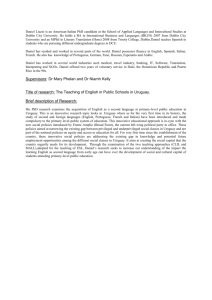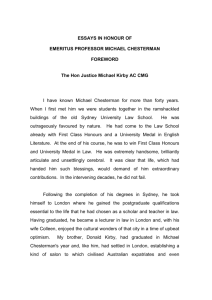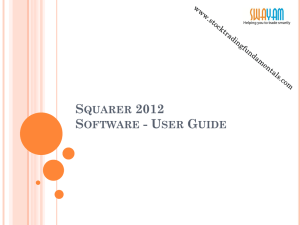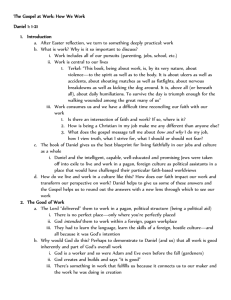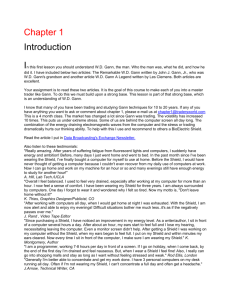Gann Bruce M. Gann Jessica Frogley ENGL 1010 – 035 30 July
advertisement
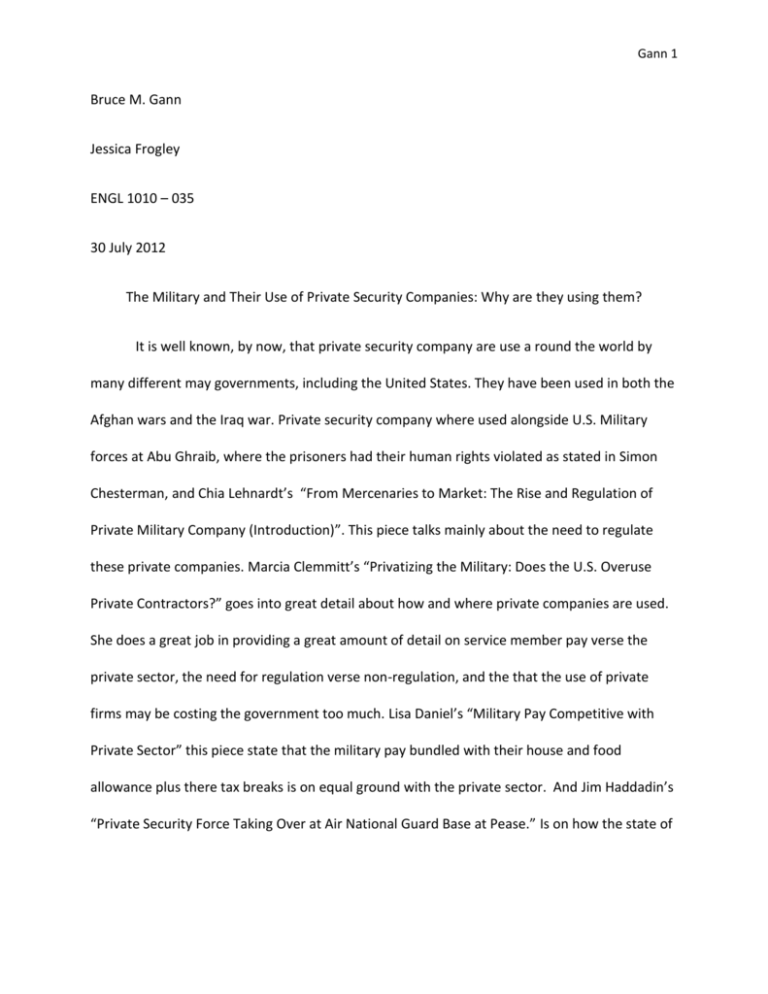
Gann 1 Bruce M. Gann Jessica Frogley ENGL 1010 – 035 30 July 2012 The Military and Their Use of Private Security Companies: Why are they using them? It is well known, by now, that private security company are use a round the world by many different may governments, including the United States. They have been used in both the Afghan wars and the Iraq war. Private security company where used alongside U.S. Military forces at Abu Ghraib, where the prisoners had their human rights violated as stated in Simon Chesterman, and Chia Lehnardt’s “From Mercenaries to Market: The Rise and Regulation of Private Military Company (Introduction)”. This piece talks mainly about the need to regulate these private companies. Marcia Clemmitt’s “Privatizing the Military: Does the U.S. Overuse Private Contractors?” goes into great detail about how and where private companies are used. She does a great job in providing a great amount of detail on service member pay verse the private sector, the need for regulation verse non-regulation, and the that the use of private firms may be costing the government too much. Lisa Daniel’s “Military Pay Competitive with Private Sector” this piece state that the military pay bundled with their house and food allowance plus there tax breaks is on equal ground with the private sector. And Jim Haddadin’s “Private Security Force Taking Over at Air National Guard Base at Pease.” Is on how the state of Gann 2 N.H. is moving away from state employees to the use of private security company for the use of base guards and patrolmen. The one thing that none of these works mention is “Why?” why use private security company instead of the service members themselves, in the active duty military has since its inception? Is it really coast effective to use private company over the soldiers and sailors already in the employ of the government? Gann 3 Chesterman, Simon and Chia Lehnardt. “From Mercenaries to Market: The Rise and Regulation of Private Military Company (Introduction)”. From Mercenaries to Market: The Rise and Regulation of Private Military Company. Oxford University Press 2007. Google Scholar. PDF. 19 July 2012 In May 2007, Dean of the National University of Singapore Faculty of Law and a Senior Fellow of the Institute for International Law and Justice at New York University School of Law Simon Chesterman and Doctoral Student Chia Lehnardt wrote, “From Mercenaries to Market: The Rise and Regulation of Private Military Company (Introduction)”. Chesterman and Lehnardt are looking at the need to regulate “Private Military Companies (PMC)” on an international level. They state that after a study was done there is need for further government regulations. Chesterman and Lehnardt assert that after a review of the situation was conducted, by Kevin O’Brian, a theoretical proposal was made to establish oversight of military operations in order to change the strategic environment of operations. They declare there are moral and political issues coming from PMC role. Chesterman and Lehnardt maintain that there are principled, abstract, and political issues being combined by real differences in the theaters where PMC’s are acting. They claim that there are problems showing up from security sector reform in different governments. Chesterman and Lehnardt stresses a look at the problems in the part that security sector reforms and the parts that PMC’s are playing in transitional states and governments around the world. The credibility of this work is in place, this is a major research paper for a prestigious university in which Simon Chesterman is dean of and also a professor. He has been published in Gann 4 several academic publications, all of them are peer reviewed. This paper has been peer reviewed before published and the research paper has since been turned into a book. The only facts that can be found on Chia Lehnardt are she was the editor for this paper. They are using this paper as a fill in the gap thesis. There is ethos in the paper with the use of expert witnesses. These witnesses are stated to have looked at different aspects of the issue in each chapter of the book. This article goes into great detail about International feeling of the use of private security, and the need to regulate their use in the world courts. This piece does not go into the cost benefits at all. It does not talk about why governments use private security company. This piece will not be of great benefit to my argument. Gann 5 Clemmitt, Marcia. “Privatizing the Military: Does the U.S. Overuse Private Contractors?”. CQ Researcher 22.25 (13 July 2012): 597-620. CQ Researcher. Web. 17 July 2012. In July 2012, CQ Researcher Staff Writer Marcia Clemmitt wrote “Privatizing the Military: Does the U.S. Overuse Private Contractors?” Clemmitt argues that the United States may be using private securities firms to much and it may be costing the tax payers more than necessary. She claims that the United States has been using private firms more that the American People are aware. Clemmitt insists The United States has used private security firms in and out of the theater of operations for nearly two decades. She cites there is a possible issue of service members retention may decline in favor for higher paying private security jobs. Clemmitt asserts that experts mention the higher pay and suppler arrangements done by the private security companies may damage the spirit of the lower-paid troops, but also inspire service members to leave the armed forces for the private sector. She reports the private companies are not held to the same amount of responsibility. Clemmitt argues that the in the case of the abuses at Abu Ghraib, eleven member of the military where convicted, and no private freelancers have be criminally charged. Marcia Clemmitt is a staff writer with CQ Researcher, a global facts researcher, is a former editor and chief of a medical magazine. She is a highly experienced social-policy reporter. Clemmitt has many degrees with prestigious universities such as St. Johns Collage and Georgetown University. She has taught high school math and physics. Clemmitt has large amount of information in the form of diagrams, pictures, and expert witnesses. She reports on counterarguments in multiple places to include a column form listing the pro and opposed side Gann 6 to the issue of congress increasing oversight of private contractors. She also makes excellent use of time lines. This is the first piece I found for my working thesis. It is so rich of information that it set my mind working right from the start. The one question it does not ask is “Why?” It talks regulation and control of private firms. It goes into great detail with experts talking about pros and cons of using them. It does not state as to if it is cost effective or not. Gann 7 Daniel, Lisa. “Military Pay Competitive with Private Sector”. American Forces Press Service 29 April 2010. USA.gov. Web. 19 July 2012 In 2010, American Armed Forces Press Service Columnist Lisa Daniel wrote “Military Pay Competitive with Private Sector”. Daniel argues that United States Military reparation is contending well with their civilian equivalents. She claims military personnel are paid high compensations then civilians. Daniel states that when compared to their to their civilian counterparts, with the same education and experience, combining the service members’ base pay, room and board stipends, and the Federal tax breaks, service members are paid 70 percent more. She argues that with a reenlistment bonus the retention rate for essential needs jobs would reach a number of service members, rather than providing a low pay raise for all members. Daniel reports that an investment of $340 million would enable 11,000 in high demand service members to receive $30,000 in incentive pay, as opposed to every service member receiving a low one half of a percent raise. She stated that the experts all agree that the benefits package compares admirably to civilian security companies. Daniel asserts, the experts agree that the total military benefits package is greater than 80 percent larger, some studies suggest, than the civilian security companies. Lisa Daniel is a creditable source in that she has a large amount of articles published through the American Forces Press Service and they, as do most press services, have fact checkers. She also uses four “experts” in her article, William J. Carr, deputy undersecretary of defense for personnel policy, Brenda Farrell of the Government Accountability Office, Carla Tighe Murray of the Congressional Budget Office, and James Hosek of the RAND Corporation Gann 8 think tank’s national security division. Daniel’s use of facts and figures indicates an inductive argument. For examples, Daniel states “A $340 million investment in such pays could provide $30,000 bonuses to more than 11,000 servicemembers the military especially needs…” and “The services paid out $6.4 billion in specialty pays last year, comprising 4.4 percent of the personnel budget.” In using these examples she is showing a good example of logos. She states that it would be better to use $340 billion to pay 11,000 military men and women a $30,000 dollar in bonuses, then to spread that money over everyone only giving each member one half of one present raise in pay. She is showing that she has a clear understands the issue, which is a good use of ethos. This piece talks a lot about how the military members pay is comparable to the private sector. It has lots of facts and figures in it. However it does not address the issue of cost effectiveness of using private security firms. This piece can be used to counter a claim of private contracts being better for the individual. Gann 9 Haddadin, Jim. “Private Security Force Taking Over at Air National Guard Base at Pease.”. McClatchy – Tribune Business News 08 March 2012. ProQuest Newsstand. Web. 28 July 2012. On 08 March 2012, News Correspondent Jim Haddadin wrote, “Private Security Force Taking Over at Air National Guard Base at Pease.” for the McClatchy – Tribune Business News. He reports the private security company Securitas Security Services U.S.A. will take over armed security procedures at Pease Air National Guard Base in New Hampshire, putting state employees out of work. Haddadin states that the securities company will take over security for the base. He reports the deal will employ eight armed sentries to be on site at any one time divided into three work shifts. Haddadin suggests that hiring a private security company will save the state money. He claims that change should lower the amount the State has to pay from one hundred thousand dollars to a hundred and fifty thousand per year. Haddadin states that there is opposition to the deal. He reports that Executive Council Member Dan St. Hilaire and a member of the union for state employees do not believe that the $100,000 mark will be reached. Jim Haddadin is a news correspondent for McClatchy – Tribune Business News, which uses fact checkers, is a credible source. Haddadin also uses expert witnesses in, the state AG and counsel member giving opposing augments as to the cost effectiveness of the venture. However this article is about an Air National Guard Base and not main stream military. I do not see that this article will be benefit to my argument, it neither supports or contradicts the stance.





